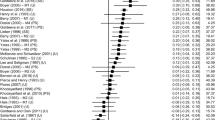Abstract
Two studies were carried out to explore if sex differences in expectancy and attribution of achievement are related to sex differences in academic performance. Study I investigated expectancy and attribution of achievement, operationalized as grade point index, among 176 male and 116 female college freshmen. Men were found to form higher expectations for future grades. Attributions measured through assigning percentage weights to ability, luck, effort, and difficulty as causal explanations of one's grade point index showed that men make more ability and women more effort attributions. Despite these differences in expectancy and attribution patterns, men and women were found not to differ in their performance. In Study II 120 college freshmen, half of them male, half female, filled out questionnaires before and after a midterm examination. A subsample of 49 also completed the Bem Sex Role Inventory. The results basically confirm the previous study's findings, except in Study II, men and women gave equally high weights to effort as a cause. The results also show that a feminine sex-role orientation is associated with a debilitating pattern of expectancy and attribution and lower performance, especially among women. Implications of the results for unraveling inconsistencies in the attribution literature and for a need to clarify connotations of femininity are discussed.
Similar content being viewed by others
References
Arkin, R. M., & Maruyama, G. M. Attribution, affect and college exam performance. Journal of Educational Psychology, 1979, 71, 85–93.
Bem, S. L. The measurement of psychological androgyny. Journal of Consulting and Clinical Psychology, 1974, 42(2), 155–162.
Bem, S. L. On the utility of alternative procedures for assessing psychological androgyny. Journal of Consulting and Clinical Psychology, 1977, 45, 196–205.
Broverman, I. K., Vogel, S. R., Broverman, D. M., Clarkson, F. E., & Rosenkrantz, P. S. Sex-role stereotypes: A current appraisal. Journal of Social Issues, 1972, 28, 59–78.
Crandall, V. C. Sex differences in expectancy of intellectual and academic reinforcement. In C. P. Smith (Ed.), Achievement-related motives in children. New York: Russell Sage, 1969.
Elig, T. W., & Frieze, I. H. Measuring causal attributions for success and failure. Journal of Personality and Social Psychology, 1979, 37, 621–634.
Feather, N. T. Causal attributions for success and failure in relation to initial confidence and task performance. Journal of Personality and Social Psychology, 1969, 13, 129–144.
Feather, N. T., & Simon, J. G. Fear of success and causal attribution for outcome. Journal of Personality, 1973, 41, 525–542.
Frieze, I. H. Internal and external psychological barriers for women in science. In J. A. Ramaley (Ed.), Covert discrimination and women in the sciences (AAAS Symposium Series). Boulder, Col.: Westview Press, 1978.
Frieze, I. H., Fisher, J., Hanusa, B., McHugh, M., & Valle, V. A. Attributions of success and failure as internal and external barriers to achievement in women. In J. S. Sherman & F. Denmark (Eds.), Psychology of women: Future of research. New York: Psychological Dimensions, 1978.
Jackaway, R. Sex differences in achievement motivation, behavior, and attributions about success and failure. Unpublished doctoral dissertation, State University of New York at Albany, 1974.
Luginbuhl, J. E. R., Crowe, S. H., & Kahan, J. P. Causal attributions for success and failure. Journal of Personality and Social Psychology, 1975, 31, 86–93.
McArthur, L. Z. Note on sex differences in causal attributions. Psychological Reports, 1976, 38, 29–30.
McMahan, I. Relationship between causal attributions and expectancy of success. Journal of Personality and Social Psychology, 1973, 28, 108–114.
Simon, J. G., & Feather, N. T. Causal attributions for success and failure at university examinations. Journal of Educational Psychology, 1973, 64, 46–56.
Spence, J. T., Helmreich, R., & Stapp, J. Ratings of self and peers on sex-role attributes and their relation to self-esteem and conceptions of masculinity and feminity. Journal of Personality and Social Psychology, 1975, 32, 29–39.
Weiner, B. A theory of motivation for some classroom experience. Journal of Educational Psychology, 1979, 71, 3–25.
Weiner, B., Frieze, I., Kukla, A., Reed, I., Rest, S. A., & Rosenbaum, R. M. Perceiving the causes of success and failure. New York: General Learning Press, 1971.
Author information
Authors and Affiliations
Additional information
The author wishes to express her gratitude to the members of the Psychology and Guidance Division of the College of Basic Studies, Boston University, for their assistance in preparing the questionnaire and collecting the data for Study I. Research for Study II was supported by grant MH 31181-01 from the National Institute of Mental Health. Mark Nachbar provided assistance in analyzing the data to both studies. Jan Mokros, Joseph Pleck, and Dan Jaquette provided valuable comments on an earlier version of this article.
Rights and permissions
About this article
Cite this article
Erkut, S. Exploring sex differences in expectancy, attribution, and academic achievement. Sex Roles 9, 217–231 (1983). https://doi.org/10.1007/BF00289625
Issue Date:
DOI: https://doi.org/10.1007/BF00289625




